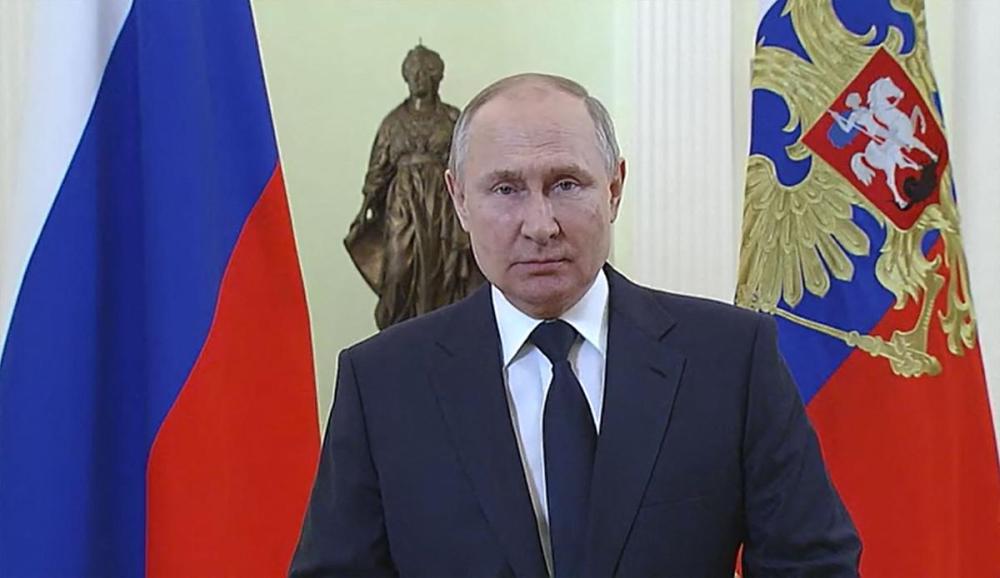Putin’s tyranny is well known and long ignored
Advertisement
Read this article for free:
or
Already have an account? Log in here »
To continue reading, please subscribe:
Monthly Digital Subscription
$0 for the first 4 weeks*
- Enjoy unlimited reading on winnipegfreepress.com
- Read the E-Edition, our digital replica newspaper
- Access News Break, our award-winning app
- Play interactive puzzles
*No charge for 4 weeks then price increases to the regular rate of $19.00 plus GST every four weeks. Offer available to new and qualified returning subscribers only. Cancel any time.
Monthly Digital Subscription
$4.75/week*
- Enjoy unlimited reading on winnipegfreepress.com
- Read the E-Edition, our digital replica newspaper
- Access News Break, our award-winning app
- Play interactive puzzles
*Billed as $19 plus GST every four weeks. Cancel any time.
To continue reading, please subscribe:
Add Free Press access to your Brandon Sun subscription for only an additional
$1 for the first 4 weeks*
*Your next subscription payment will increase by $1.00 and you will be charged $16.99 plus GST for four weeks. After four weeks, your payment will increase to $23.99 plus GST every four weeks.
Read unlimited articles for free today:
or
Already have an account? Log in here »
Hey there, time traveller!
This article was published 08/03/2022 (1375 days ago), so information in it may no longer be current.
The world shouldn’t have needed Russia’s unprovoked invasion of Ukraine to realize the dangerous depravity of Vladimir Putin.
Since returning to power as his country’s president 10 years ago, he’s provided ample evidence — trampling human rights, forsaking democratic norms, occupying foreign territory and rewriting history.
Indeed, given his tyrannical record, his brutal assault on a sovereign nation should have astounded no one. What is surprising is that his massive human rights abuses over the past 20 years never triggered widespread outrage and international resolve until now.

A former officer in the KGB, Putin has long shown dictatorial tendencies. Since his first presidential win in 2000, he has taken Russia down a slippery slope of ruthless, anti-democratic rule to the point where today he exercises near-absolute control of the country.
In addition to his war crimes against Ukraine, Putin has proven true to form at home where he has intensified his already cruel, repressive measures against his people, including anti-war activists, independent media and anyone who dares protest his despotic actions. So far, he has had more than 10,000 Russians arrested for protesting his invasion of Ukraine.
Nevermind that the rights of Russians are supposed to be protected by domestic and international law — well and good in theory, except for Putin’s brazen disregard for democracy and individual liberty. Legal protection is no match for an autocratic leader who brooks no interference or opposition and has instituted restrictive legislation to undermine the constitutional defence of citizens’ rights.
While consolidating power and ignoring the rule of law, his unchecked authority has exacted a high price. It includes jailing political opponents; muzzling the media; controlling a propaganda machine; peddling anti-Western conspiracy theories; harassing journalists; attacking neighbouring states to reassemble pieces of the old Soviet empire; and interfering in elections in several countries.
All that without mentioning the scores of Russian opposition politicians, lawmakers, journalists and critics targeted by assassins at home and abroad, raising suspicions about Putin’s complicity.
Take the case of opposition leader Alexei Navalny, founder of the Anti-Corruption Foundation and Putin critic. After surviving a near-fatal nerve agent attack in 2020, widely attributed to the Kremlin, he was arrested upon returning to Russia. He remains in prison and last month went on trial on fresh fraud charges that could keep him jailed for an additional 10 to 15 years.
Sadly, there are many other egregious cases, including the 2015 assassination of opposition leader Boris Nemtsov, an outspoken critic of Putin, gunned down while walking near the Kremlin.
Justifying his illegal invasion of Ukraine with preposterous claims and supposed historical injustices based on delusional revisionism, Putin declared his goal was the “de-nazification” of Ukraine, whose Jewish president lost relatives in the Holocaust. Last week, in attacking Kyiv, Russian forces bombed the site of the Babyn Yar mass grave, where Nazis and their collaborators murdered 34,000 Jews in 1941 in one of the largest massacres of the Second World War.
Putin’s vicious onslaught on Ukraine is consistent with past actions, such as his 2016 month-long carpet-bombing of Aleppo, Syria that killed hundreds of civilians as part of his effort to keep barbaric dictator Bashar Assad in power. Still, his invasion of Ukraine is a significant escalation of such behaviour.
It’s also a test of the world’s commitment to the Responsibility to Protect doctrine, which every member state of the United Nations endorsed in 2005. It requires the international community to intervene when a country can’t protect its population against genocide, war crimes, ethnic cleansing and crimes against humanity.
In the wake of Russia’s invasion of Ukraine, more and more countries are coming to the recognition, albeit long overdue, of their moral and legal obligation to stand up to Putin’s tyranny. I pray their response won’t prove too little, too late.
Michael Levitt, a Toronto-based freelance contributing columnist for the Star, is the president and CEO of Friends of Simon Wiesenthal Center for Holocaust Studies (FSWC). Follow him on Twitter: @LevittMichael


